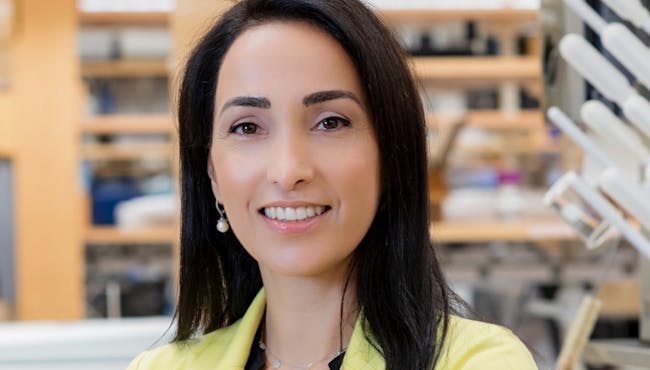
Natalie Artzi is the Associate Institute Director and a Core Faculty of the Wyss Institute, and the Hansjörg Wyss Professor of Biologically Inspired Engineering at Harvard Medical School and Brigham and Women’s Hospital. She is also a Principal Research Scientist at the Institute for Medical Engineering and Science at MIT, and is an Associate Member of the Broad Institute of Harvard and MIT. Leveraging material science, chemistry, imaging, and biology, Dr. Artzi’s laboratory is dedicated to designing smart biomaterial platforms and medical devices to improve human health.
Trained as a chemical engineer at the Technion (Israel Institute of Technology) and MIT, Artzi pioneered basic understanding of the contextual performance of biomaterials under different environments and pathological states, and concepts learned have changed the way we view materials. Materials and devices are designed to be tissue responsive, that is, to sense and respond to specific cues in the tissue microenvironment that are altered in the face of disease. Her multidisciplinary team works on developing materials for diagnosis and therapy, including the engineering of libraries of nanoparticles for targeted gene therapy, and exploits the toolkit available for material scientists to create multifaceted medical devices.
Artzi has received many honors including the inaugural Kabiller Rising Star Award in Nanotechnology and Nanomedicine, the One Brave Idea Award, Stepping Strong Innovator Award, Mid-Career Award from the Society for Biomaterials, Controlled Release Society Young Investigator Award, Bright Futures Prize, and the Massachusetts Life Science Center for women entrepreneurs. Artzi’s passion lies in medical innovation and as a biomedical researcher, professor, and an entrepreneur she works to translate new technologies to the clinic.
Artzi’s team is interested in leveraging immune engineering to treat a range of diseases including cancer, autoimmune diseases, as well as for tissue engineering applications. To maximize therapeutic outcomes, her lab is studying how delivery regimen and administration mode of combination therapies synergize with clinically-available modalities, and is investigating their effect on therapy pharmacokinetics and pharmacodynamics. Her lab has engineered hydrogel-based systems that enable local and sustained delivery of therapeutics at the target size, as well as polymeric microneedle devices that afford transdermal drug delivery as well as sampling of skin interstitial fluid to facilitate noninvasive and temporal monitoring of biomarkers including cells and soluble factors. Artzi’s platform technologies find many applications that can help advance our understanding of disease mechanisms, enable repurposing drugs and deliver emerging drugs, while monitoring the responses to the therapy over time.
